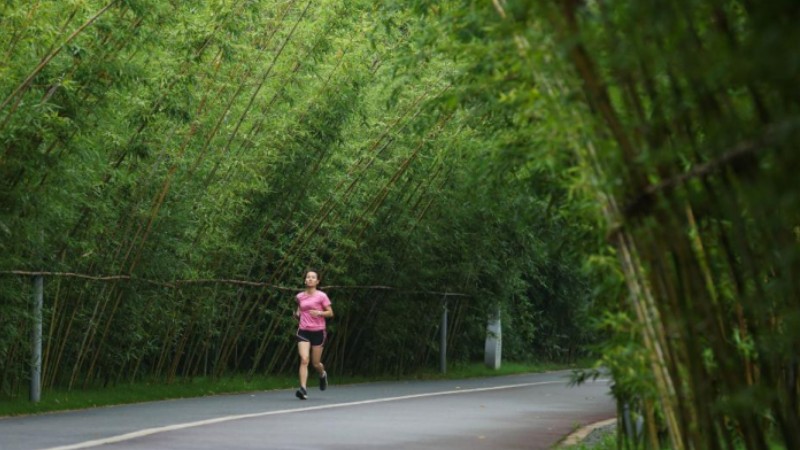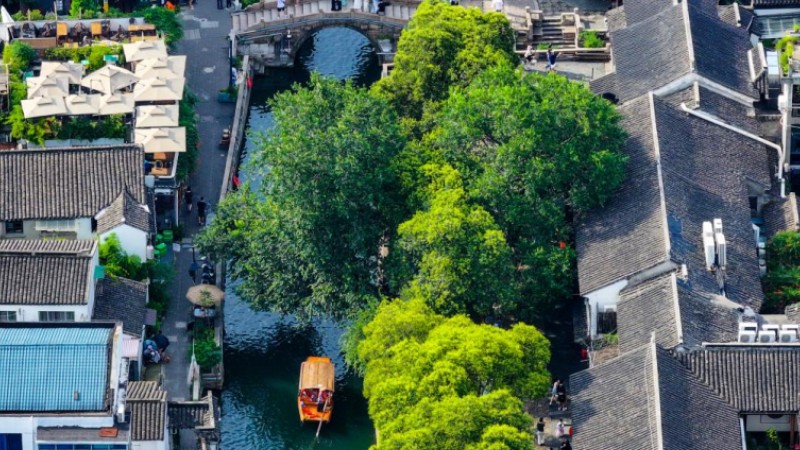Thriving tea industry brings wealth to locals in Enshi, C China's Hubei
Focusing on tea varieties, quality and brands, Enshi Tujia and Miao autonomous prefecture in central China's Hubei Province has made coordinated efforts to promote tea culture, the development of the tea industry, and the use of technology in the sector in recent years.

Photo shows a base of Enshi Yulu Tea or Jade Dew Tea in Huazhishan village of Enshi, central China's Hubei Province. (Xinhua/Wen Lin)
Now, 880 villages in the prefecture are developing the tea industry. The sector emerges as a pillar industry for 570 once-impoverished villages to promote rural revitalization by building on the success of poverty alleviation. It fattens the wallets of 830,000 tea growers, whose annual average income from the industry exceeds 7,000 yuan (about $966).
Huanglianxi village in Bajiao Dong ethnic township of the prefecture is the birthplace of Enshi Yulu Tea or Jade Dew Tea, a typical example of steamed green teas in China. In October 2022, Enshi Yulu Tea was included in that year's programs for nurturing premium agricultural brands by the Ministry of Agriculture and Rural Affairs.
Thanks to a remarkable increase in the influence of Enshi Yulu Tea, almost every household in the village now plants tea trees. Home to over 7,000 mu (about 466 hectares) of tea gardens and 19 tea processing plants, the village has become an important base of tea leaves for the tea brand in Enshi. By the end of June this year, income from tea leaves in the village had exceeded 30 million yuan, resulting in an increment in annual per capita income of more than 9,700 yuan.
During the tea picking season three months ago, Lan Yuanbin, a 44-year-old resident from Huanglianxi, and his parents could harvest 35 kilograms of fresh tea leaves from his tea gardens and earn a net profit of up to over 6,000 yuan each day. His annual net income from the tea industry exceeds 200,000 yuan.
Now, the thriving tea industry has attracted young laborers to return to the village to plant, make and sell tea.
However, in the past, Enshi had difficulty selling local tea due to the lack of brand influence, and young laborers worked elsewhere as migrant workers, including Lan Yuanbin.
In recent years, Enshi has promoted the green and standardized development of the tea industry and the building of strong brands.
With support from the local government, Lan Yuanbin and several others established a tea company in June 2018.
"We adopt a business model that involves the company, cooperatives and households. We provide tea seedlings, relevant materials, and technical guidance for tea growers, and promote the use of organic fertilizers and biopesticides. We refuse to purchase tea leaves that have excessive pesticide residue and fail to meet quality standards," said Lan Yuanbin, who is responsible for purchasing fresh tea leaves for the company.
He added that the company has strict standards for tea planting and the harvesting of tea leaves.
This year, fresh spring tea leaves grown according to the company's requirements were sold for up to more than 200 yuan per kilogram, one to two times higher than ordinary ones, said Lan Yuandong, a 56-year-old tea grower in Huanglianxi village. He added that his family's net income from selling spring tea leaves surpassed 30,000 yuan since the beginning of this year.
At present, there are over 1.8 million mu of tea gardens in Enshi. The prefecture has built a national green food and organic food (tea) raw material standardized production base that covers 778,500 mu, accounting for 43.3 percent of the total area of tea gardens.

Yang Shengwei, successor of Enshi Yulu Tea or Jade Dew Tea, processes tea leaves in Enshi, central China's Hubei Province, May 18, 2018. (Xinhua/Wen Lin)
The flourishing tea industry is inseparable from the revival of the processing techniques of Enshi Yulu Tea, which can be partly attributed to Yang Shengwei, a state-level representative inheritor of the techniques listed as a national intangible cultural heritage. For years, Yang, 86, has visited local tea workshops and senior tea makers for revitalizing the traditional techniques.
At the end of 2005, Zhang Wenqi, a businessman from east China's Jiangsu Province, registered a tea company in Bajiao Dong ethnic township. He invited over 10 senior tea makers including Yang to pass on the processing techniques of Enshi Yulu Tea, and bought modern machines to replace manual labor in some processes. As a result, the company's tea products sold out quickly after they hit the market.
In March 2007, Enshi Yulu Tea was recognized as a geographical indication (GI) product, and Zhang's company became the first enterprise authorized to use the GI mark on its Enshi Yulu Tea products. Three months later, several departments in Enshi rolled out policies to support tea companies, including offering loans with discounted interest rates.
Backed by supportive policies, Zhang poured over 16 million yuan to invite experts from institutes including Huazhong Agricultural University to develop equipment for the processing of Enshi Yulu Tea. In April 2009, Zhang's company built the first mechanized production line for the tea in the prefecture.
The production line can produce 1,500 kilograms of Enshi Yulu Tea per day and improve processing efficiency by over 50 times compared with manual work, Zhang said.
Over the past years, Enshi has invested over 2 billion yuan in supporting the technological upgrading of tea companies. At present, the prefecture is home to 2,484 tea processing companies, including 130 all-electric ones and 95 above designated size. In 2022, the prefecture achieved a dry raw tea output of 123,000 tonnes, with the output value reaching 22.44 billion yuan.

Photo shows Enshi Yulu Tea or Jade Dew Tea in Enshi, central China's Hubei Province. (Xinhua/Wen Lin)
Enshi has made efforts to ensure smooth logistics channels for selling Enshi Yulu Tea to other places across the country and has built tea trade markets to make the match between supply and demand more efficient.
Since 2020, the prefecture has given awards and subsidies of up to 200,000 yuan to entities that run Enshi Yulu Tea stores in major cities. So far, tea companies in Enshi have run 755 stores and experience halls in cities including Beijing, Shanghai and Wuhan.
The prefecture has also encouraged enterprises to develop livestreaming sessions and e-commerce to sell tea products. It has so far built eight county-level e-commerce public service centers and 1,525 village-level e-commerce outlets.
Thanks to these efforts, by the end of June since spring tea hit the market this year, Enshi has sold 70,200 tonnes of dry tea leaves with a total sales volume of more than 8 billion yuan.
In addition, Enshi has maintained the images of brands such as Enshi Yulu Tea by stepping up quality supervision and inspection of tea and improving food safety traceability and market access and exit mechanisms.
"We carry out dynamic management of the authorization of the Enshi Yulu Tea brand and strictly implement the market exit system for unqualified producers," said Su Fangjun, president of the Enshi Tujia and Miao Autonomous Prefecture Tea Industry Association.
So far, 107 enterprises in Enshi were authorized to use the GI mark on their Enshi Yulu Tea products.
Enshi has also made greater efforts to develop a system of the breeding of superior tea varieties and has cultivated several new varieties by using germplasm resources of local tea trees and multiple tea brands including Enshi Yulu Tea.
"The tea industry has grown to be the strongest among local industries that bring prosperity to local people in Enshi," said Hu Chaowen, Party chief of the prefecture.
Hu added that the prefecture will make a healthy and powerful tea industry to promote rural revitalization by building on the success of poverty alleviation and ensure that locals can embrace a better life.
Photos
Related Stories
- Tea-drinking China embraces African coffee
- Chinese tea culture exhibition opens in Sainshand, Mongolia
- Chinese tea culture-themed exhibition opens in Budapest, Hungary
- Inheritor of Liubao tea making technique in S China's Guangxi
- Event of Chinese tea culture held in Madrid
- Frothy Song Dynasty art of whisking tea
Copyright © 2023 People's Daily Online. All Rights Reserved.









